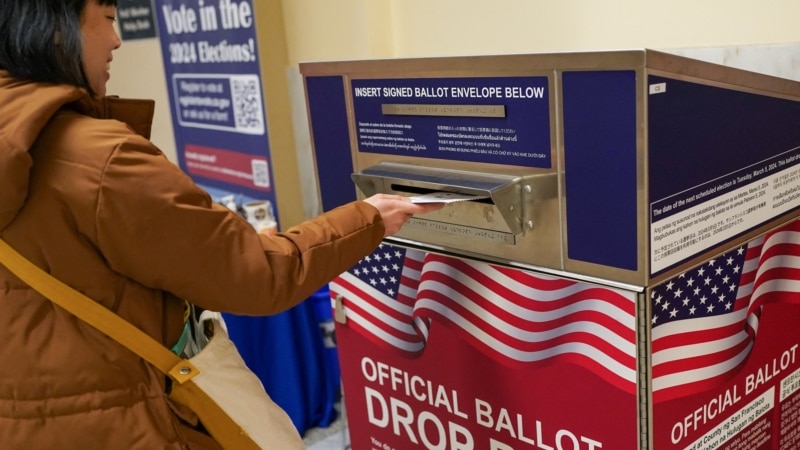
The U.S. presidential primary season still has months left to go, but most questions about the ultimate outcome are likely to be settled within the next week as voters in 15 states, including the country’s two largest, cast their ballots on March 5, while another four follow just seven days later.
On the Democratic side, President Joe Biden appears well-positioned to continue his sweep of the Democratic primaries, with no candidate seriously contesting his bid to achieve nomination for a second term.
The Republican primary has so far been dominated by former President Donald Trump, who has won every contest so far, with the exception of Sunday’s primary in Washington, D.C. Despite the continued presence of former South Carolina Governor Nikki Haley on the ballot, Trump appears poised to win most or all of the states casting their ballots on “Super Tuesday,” including delegate-rich Texas and California.
If Trump performs as expected March 5, he will be on track to surpass the total number of delegates needed to guarantee the GOP nomination when four additional states vote a week later, on March 12. This, despite the fact that nearly half of the 50 states as well as several territories will not yet have voted, and with the party’s nominating convention in Milwaukee still four full months away.
Surprisingly uncompetitive
Caitlin E. Jewitt, an associate professor of political science at Virginia Tech, told VOA that the 2024 presidential primaries have been remarkably uncompetitive. While incumbent presidents rarely face serious primary challenges, Trump’s position as the Republican Party’s most recent president and his continued hold over its base appear to be granting him similar advantages.
“We essentially have an incumbent president running against a quasi-incumbent, which is something that has never happened before,” Jewitt said. “Usually, we have a competitive nomination on at least one side, if not both, and so in many ways that is making this primary season less interesting. Candidates are really looking ahead to the general election earlier than they usually do.”
Trump is also benefiting from the rules under which the Republican primary is conducted. In most cases, she said, the Republican Party awards all of a state’s delegates to the candidate who receives the majority of primary votes, rather than distributing them proportionately.
“On Super Tuesday, President Trump will win the vast majority of, if not all, the delegates, increasing the rate at which he secures the nomination,” Jewitt said.
Haley remains
Despite little success in winning delegates, Haley remains in the Republican race, and is now playing the role of a protest candidate, using her campaign events to argue that Trump is not fit for office and that, having lost to Biden already in 2020, he may well do so again.
As of this weekend, Haley had secured just 43 delegates, compared to Trump’s 244. With 865 delegates on the line in Super Tuesday’s voting, the gap is expected to widen sharply. There are 2,429 total delegates available, meaning that a candidate needs to earn 1,215 to top 50% and win the nomination.
Jaime Dominguez, an associate professor of political science at Northwestern University, said that despite the long odds against her, Haley is still able to have a significant impact on the Republican race just by her continued presence.
“It looks like she’s going to continue to stay in the race, and that’s going to be interesting, because I see her as kind of a thorn in [Trump’s] side,” Dominguez told VOA. “Even though she’s not going to be competitive anymore — she’s not going to be able to sway the delegates — she is going to be important in terms of the messaging that the campaign puts out around particular issues.”
Biden’s challenge from the left
On the Democratic side, President Biden has so far won all of the primaries by a large margin and is expected to continue to do so. However, there is a growing effort among some on the political left to encourage Democratic voters to withhold their support from the president in protest of his support for Israel during its attacks on Gaza over the past several months.
In Michigan last week, Biden won with 81% of the votes, but 13% of voters in the Democratic primary cast their ballots as “uncommitted” rather than for Biden or another candidate.
“Coming off the momentum generated in Michigan, we need to continue lifting up our voices and sending a clear message to President Biden — we need a cease-fire now,” Joseph Geevarghese, executive director of the organization Our Revolution, said in a press release on Monday. “If we do not change course, he will be putting our Democracy at risk.”
He said that his group, along with others pushing back against Biden’s support for Israel, will work to convince Democratic voters in other states to continue registering their disapproval of Biden’s policies by declining to vote for him.
Mainly symbolic
While the protest votes will send Biden a message during the primary, Jewitt, of Virginia Tech, said that she doesn’t expect the movement to have a major impact on the way voters behave in a likely Biden vs. Trump rematch in November.
“I think right now, it is symbolic,” Jewitt said. “It shows President Biden and his administration that Democrats are frustrated with the situation in Israel and Gaza. But we need to be careful not to read too much into it.
“At this point, we are still seven months away from the general election, and especially if there’s a Trump-Biden rematch, which it looks like it will be, Democrats will likely rally around Biden, if only because they will not want another President Trump term,” she said.
